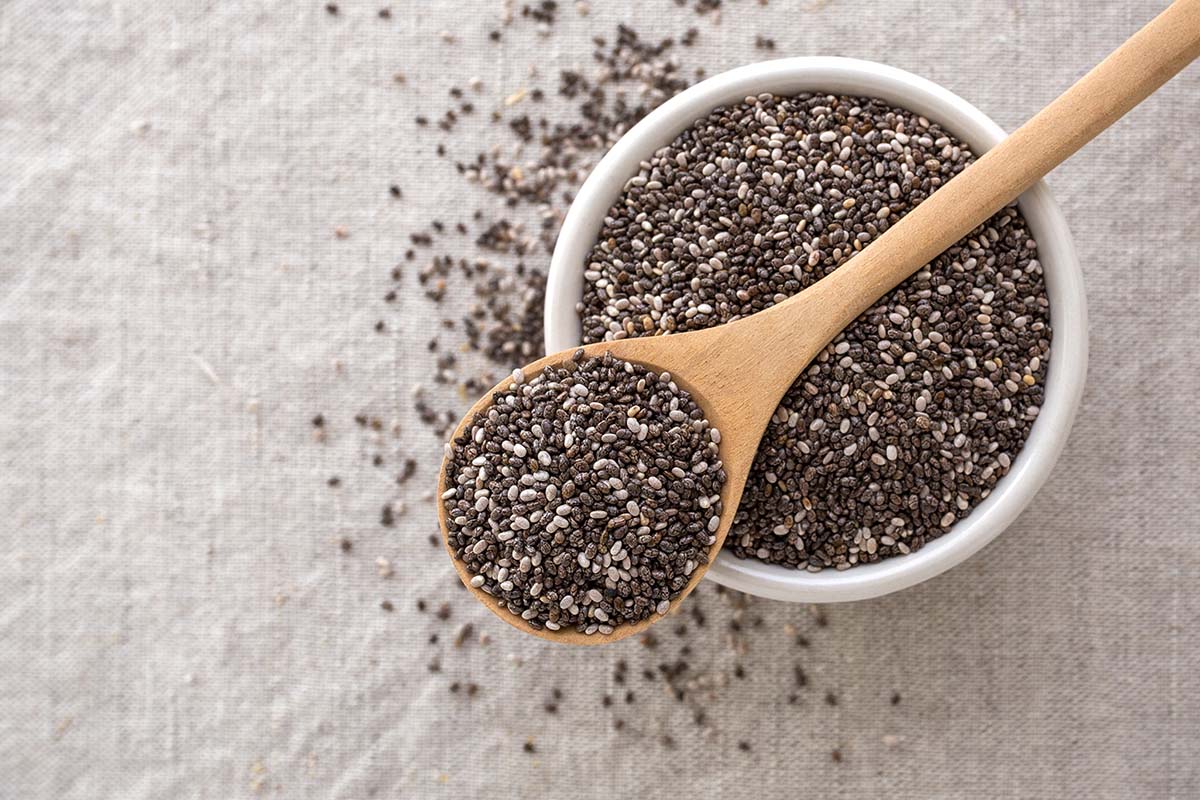Advertisement
10 Health Benefits of Chia Seeds
These nutritional powerhouses pack a real punch
Fact-Checked
This article has been written and fact-checked by experts in the field.

Reduce inflammation
Chia plants may have been popular in the 1980s (ch-ch-ch-chia!), but it’s their seeds that are considered pretty valuable these days. Once a staple in ancient Aztec diets, the seeds have been rediscovered.
Chia seeds offer a myriad of health benefits. They’re rich in antioxidants and omega-3 fats. They’re loaded with minerals and fiber. Chia seeds are even a great source of plant-based protein. Here’s an in-depth look at ten health benefits of chia seeds.

Many diseases, such as depression and cancer, are linked to inflammation. Chia seeds may reduce inflammation thanks to high levels of an antioxidant called caffeic acid. Caffeic acid is a phenolic acid found in certain foods and exhibits anti-inflammatory properties. By consuming anti-inflammatory foods, like chia seeds, you may be lowering your risk of disease.
Aid in weight management

Yep, chia seeds may actually help you lose weight. In one study, researchers found that participants who consumed 35 grams (2.5 tbsp) of chia flour daily experienced a decrease in their weight compared to participants in the placebo group. It’s believed that their high fiber content helps curb your appetite. Along with a healthy diet and exercise, eating chia seeds is a great step to help support weight management.
Reduce blood sugar levels

Researchers discovered that consuming chia seeds reduces postprandial glycemia. Postprandial glycemia is a scientific term for the sugar levels in your blood after a meal. High blood sugar can be dangerous, especially for those who have diabetes. By adding chia seeds to your meals, they may help you to maintain a healthy glucose level in your bloodstream.
Improve bone health

Two tablespoons of chia seeds have 18 percent of the recommended daily allowance of calcium. For those who are lactose intolerant or just aren’t fans of consuming dairy, it’s important to know which non-dairy foods have calcium. Without it, our bodies may not grow to their full potential, and calcium deficiencies may lead to osteoporosis. Chia seeds are a great source of this crucial mineral.
A complete plant-based protein

Protein is an important part of the human diet. It supports everything from making antibodies to maintaining energy. Unfortunately, many of us struggle to reach our daily dietary requirements, especially vegetarians and vegans. Chia seeds are considered a high-quality source of plant-based protein and have a good balance of essential amino acids.
Lower cholesterol

Consuming insoluble fiber helps lower dangerous LDL cholesterol levels. Studies show that chia seeds have 23 percent to 41 percent insoluble fiber and 15 percent soluble fiber. Researchers believe their high insoluble fiber content may reduce LDL levels contributing to overall lower cholesterol.
Lower your risk for heart disease

Chia seeds have a large amount of the omega-3 fatty acid, alpha-linolenic acid (ALA). ALA plays a key role in cardiovascular health. It helps your heart function properly and also reduces the chance of developing blood clots. In addition to ALA, the fiber content in chia seeds may also help to lower your blood pressure and reduce your risk of heart disease.
Improve skin conditions

When applied topically, chia seed oil can lessen certain skin ailments. In one study, researchers asked participants with itchy skin—some caused by eczema and others by chronic illness—to apply the oil to their skin for eight weeks. All patients experienced significant improvement in skin hydration and disease. Chia seed oil can be purchased online or at some cosmetic stores.
Help your digestive woes

Chia seeds have a lot of fiber. In fact, more than bran, soy and quinoa. One ounce of chia seeds has 39 percent of the recommended daily allowance. Fiber gets things moving in your digestive tract and can alleviate constipation. Consuming chia seeds may provide you with some relief if you suffer from irregularity.
Contribute to a healthy pregnancy

When you’re pregnant, there are so many things you’re told you shouldn’t eat—sushi, soft cheese, etc. But what about chia pudding? Chia seed consumption can help to develop the retina and brain of your baby in utero. Not only are they good for you and your baby, but they might squash a craving or two!





